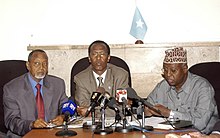Ali Mohammed Ghedi
Ali Mohammed Ghedi (* 1952 in Mogadishu ) was Prime Minister of Somalia's interim government from December 2004 to October 2007 .
Political position
Ali Mohammed Ghedi was still unknown in political circles when he took office. He is not seen as a career politician, but as an intellectual. He got his seat in parliament when one of the warlords left his post in Ghedi's favor. Ghedi was sworn in in the exile of the Somali parliament in Kenya . As his greatest political strength is membership in the Hawiye - communities of Mogadishu seen, the second largest communities in the country. President Abdullahi Yusuf Ahmed , who has been in office since 2004, belongs to another large clan, the Darod , and is rather unpopular in Mogadishu.
Since the outbreak of the conflict, Ghedi has been considered a politician who stands for reconciliation between the conflicting parties. It was hoped that he would succeed in uniting the country's various warlords. As a founding member and President of the Somalia NGO Consortium , an umbrella group of NGOs in Somalia, he had attended many reconciliation meetings in Somalia and abroad. He is considered a unifier who is said to have never been in contact with any of the warring parties during the war. In the 1970s, however, he had completed his military service. Ghedi's election as prime minister was an attempt to restore balance in the country and, after 13 years of civil war, to achieve greater acceptance of the government among the population due to conflict between the clans.
career
After graduating from school in his native Mogadishu, he went to the universities of Somalia and later to Italy to study veterinary medicine. Until the outbreak of the civil war, he was a lecturer and researcher at the National University of Somalia . After the university closed, he devoted himself to the animals whose population was threatened by the conflict. He worked as a consultant for various regional breeders.
From Nairobi he headed an internationally funded program to preserve biodiversity in Somalia.
On June 3, 2007, Ghedi's home in Mogadishu was suicide bombed, killing at least seven people and injuring many others. Ghedi himself survived the attack unharmed. It was the third attack against him.
On October 29, 2007, he resigned because of differences with President Abdullahi Yusuf Ahmed . The deputy prime minister and friend Ghedis Salim Aliyow Ibrow became his interim successor, Nur Hassan Hussein became his definitive successor .
Web links
- Somali PM escapes suicide attack (English)
- BBC News: Somali prime minister steps down (English)
| personal data | |
|---|---|
| SURNAME | Ghedi, Ali Mohammed |
| BRIEF DESCRIPTION | Somali Prime Minister |
| DATE OF BIRTH | 1952 |
| PLACE OF BIRTH | Mogadishu |
